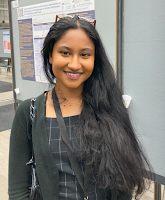Theresa Antony, Verrazzano Class of 2024, completed major in Biology

My thesis focused on examining computational thinking (CT) and creativity skills among autistic students who were enrolled in a Game Design and Employment workshop. I wanted to examine these skills since previous literature has shown that CT and creativity are skills that are necessary in the workplace. Autistic students have difficulty attaining their employment goals compared to their neurotypical counterparts. As a result, fostering these skills might be useful in helping autistic students to overcome systemic barriers and discrimination in the workplace. Additionally, it will allow us to guide autistic youth to be better prepared for their future jobs and as a result, ultimately improve employment outcomes among autistic people.
CT was measured using assessments derived from previous literature, and creativity was assessed in two ways. One way was to examine the games the students created by the end of the program. This was done by looking at the diversity and the number of frontend game elements, elements in a game that a player can view and interact with that were incorporated into the games by the students. Another way was to look at the originality of the responses the students had to the Alternatives Uses Task (AUT). AUT required the students to list as many possible ways to use a specific item that was provided. After assessing these skills, we investigated the relationship between these skills and constructs we selected before the study commenced. These constructs included student-reported engagement, self-efficacy (the belief in oneself to complete a goal/task), and cognitive skills (sequential reasoning).
I was surprised to see that income was a predictor of creativity in the context of the games. This suggests the need to close the gap between lower and higher income neurodivergent students to reduce digital inequality. Additionally, cognitive skills, in this case, sequential reasoning, and student-reported engagement with workshop activities were predictors of computational thinking. These findings showed that educators can work to facilitate predictors such as engagement in the classroom or cognitive skills such as sequential reasoning to help foster CT and creativity skills among students. From these results, I learned the importance of fostering skills among autistic youth and the need to do so to help them toward their employment goals. I also learned that even within a marginalized group, there can be differences between the individuals (e.g., income level) that place them at an advantage compared to their counterparts.
From this project, I expected more significant relationships between the constructs, but I had interesting findings. I learned a lot from this process, especially since I was on a time crunch. I learned to manage my time, work with new types of data, and write a paper that was quite long. I am also grateful for my mentor and other readers who have provided me with helpful feedback which I believe helped me develop a strong thesis.